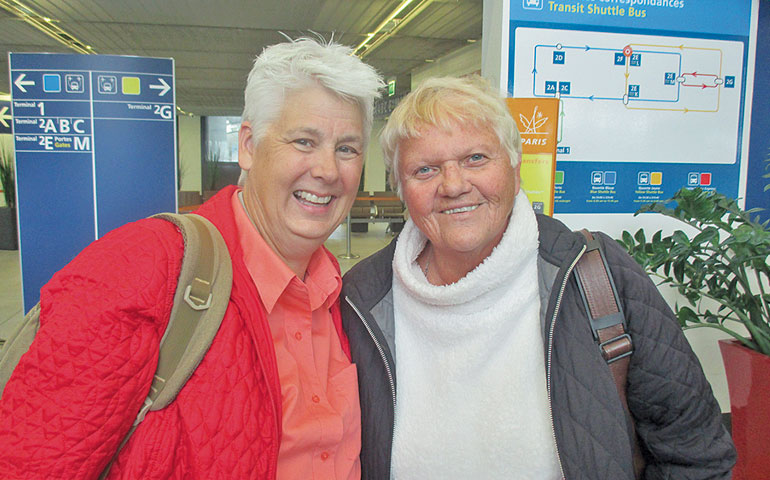
Honour Maddock, left, and Kathleen Kane at the airport on the way to a Rome pilgrimage and a special audience with Pope Francis (Courtesy of Francis DeBernardo)
With the celebration of the family coming up in September, when families all over the world will converge in Philadelphia for the World Meeting of Families Congress, I can’t help but think about what it means to be a family. Is it a marriage license or a wedding ceremony? Is it biological children? Is it both? Or neither?
I think about Kathleen, whose family story captivates me. She grew up in the 1950s in a poor section of Brooklyn, N.Y., with a saintly, hard-working mother, an alcoholic father who beat his wife, two brothers (the younger of whom she helped raise), and an older sister who often scolded her.
“The toughest struggle we faced was not poverty, but a combination of sexism, alcoholism and domestic violence,” Kathleen told me. She found consolation and peace in daily Mass and novenas, even though no one in her family was a churchgoer. Kathleen felt happy and safe during that hour, and her faith in a kind and loving Father-God grew.
At age 16, she met a man three years older, who showered her with attention. They married two years later, and three children were born within 13 years. Kathleen loved being a mother, but her husband wanted her entire attention and resented the time she spent with their children. Their relationship grew strained, and they became increasingly quarrelsome with each other.
“I turned to my faith and prayed for guidance,” Kathleen said. Eventually she met a young woman named Honour who would become a confidante during this trying time.
On a Cursillo weekend at church, Kathleen spoke with a priest about her home life. Expecting to be told that she needed to try harder to make the marriage work, she was surprised when the priest assured her that she should not feel guilty, that she was a good wife and mother, and that her husband needed to change. When she shared this advice with her husband, he too was surprised. He had expected the priest to counsel Kathleen to obey her husband.
Shortly thereafter, there was another shock.
“When my husband didn’t come home one day, I asked my neighbor if she had seen him,” Kathleen told me. “ ‘Yes, he left this morning with suitcases in hand,’ my neighbor said.”
He never came back, but he let Kathleen know that he did not want custody of the children, only the car and a way to pay his debts. They got a divorce.
For years, Kathleen worked hard to support her children and pay off all the loans. Throughout this time, Honour was her lifeblood. Kathleen felt joy whenever Honour was around and missed her when they were apart. After some time they both came to realize that their companionship had blossomed into something deeper.
“Our wonderful friendship evolved into the beautiful love we’ve now shared for over 30 years,” Kathleen told me. Although neither Kathleen nor Honour had ever been in a lesbian relationship, they wanted to be committed to each other.
They naturally wanted to live together, but given the “talk” that Kathleen’s children would endure in the intolerant atmosphere of the 1980s, they decided to wait until the youngest daughter departed for Fordham University. Finally, they claimed a home of their own, but not an exclusive one; their home was always open to others in need.
For example, when Kathleen’s granddaughter was sexually abused, the 17-year-old found protection and comfort with Kathleen and Honour for more than two years while she finished college and started a career.
Kathleen’s eyes lit up as she remembered those days: “We did everything together as a family. We would discuss current events and what she learned at school. Honour and I just loved having her youthful energy around us!”
When Kathleen’s mother needed care, she lived her last 10 years with Kathleen and Honour.
“We had dinner with my mother, played many games of Scrabble in the evening, took her to Mass on Sunday and to practically everywhere we went,” Kathleen said.
When the diocese approved a support group for families of lesbian, gay, bisexual and transgender Catholics, they brought her to the gatherings. “She really enjoyed getting together with other parents at the church,” Kathleen recalled.
Kathleen and Honour attended Mass together.
“I’ve always had a deep, visceral connection with my Catholic faith,” Kathleen said. “I’m not sure that the church will ever change its views about lesbian and gay people, but I firmly believe my relationship with Honour is a blessing God bestowed on me. All the opposition we encountered from society and church teachings could never shatter my trust that our love is a gift from God.”
I’ve meditated a lot on Kathleen’s amazing story and about the meaning of a family. I think about her family when she was a child growing up. Society and church would say that they were a family because they were a mother, a father and four biological children. Sure, they may have been a highly dysfunctional family, where physical beatings and the fear of drunken rages were simply normal fare. Still, they were a family, weren’t they?
I think about her family life with her husband. Yes, they had a marriage license for one man and one woman for more than 20 years. Kathleen with her husband and children must be a family, even though his suspicion, jealousy, and total lack of interest in the children were demolishing the spousal relationship. Yes, they must be a family, even though her husband would not seek counseling because, as he said, he did not need to change.
I think about her life with Honour and their time with Kathleen’s mother and granddaughter. For most of their years together, Kathleen and Honour had no marriage license and they had no biological children from their union. What they did have was the deepest kind of love I have encountered — the love of sacrifice for each other, for those they care about, and for those in need, the love of putting the other’s happiness and welfare first, the love of common spiritual values, the love of feeling uniquely blessed by God because of the other.
The love of Kathleen and Honour makes me think of the theme of the World Meeting of Families: “Love Is Our Mission: The Family Fully Alive.”
[Loretto Sr. Jeannine Gramick is a leading advocate for LGBT rights as a co-founder of New Ways Ministry.]
